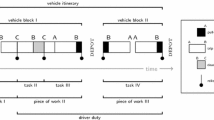Abstract
We present a new model for the vehicle and crew scheduling problem in urban public transport systems by combining models for vehicle and crew scheduling that cover a great variety of real world aspects, including constraints for crews resulting from wage agreements and company regulations. The main part of the model consists of a set partitioning formulation to cover each trip. A column generation algorithm is implemented to calculate the continuous relaxation which is embedded in a branch and bound approach to generate an exact solution for the problem. To improve the lower bounds, polyhedral cuts basing on clique detection and a variant of the column generation algorithm that suits the cuts were tested.
Access this chapter
Tax calculation will be finalised at checkout
Purchases are for personal use only
Preview
Unable to display preview. Download preview PDF.
Similar content being viewed by others
References
Ball, M./Bodin, L./Dial, R. (1983): A matching based heuristic for scheduling mass transit crews and vehicles. in: Transportation Science 17, 4–31.
Dell’Allmico, M./Fischetti, M./Toth, P. (1993): Heuristic algorithms for the multiple depot vehicle scheduling problem. in: Management Science 39, 115–125.
Desrochers, M. (1988): An algorithm for the shortest path problem with resource constraints. Cahiers du GÉRAD G-88–27, École des H.E.C., Montreal, Canada.
Desrochers, M./Desrosiers, J./Solomon, M. (1992): A new optimization algorithm for the vehicle routing problem with time windows. in: Operations Research 40, 342–354.
Desrochers, M./Gilbert, J./Sauvé, M./Soumis, F. (1992): CREW-OPT: Subproblem modeling in a column generation approach to urban crew scheduling. in: Desrochers, M./Rousseau, J.M. (eds.): Computer-Aided Transit Scheduling: Proceedings of the Fifth International Workshop. (Springer) Berlin, 395–406.
Desrochers, M./Soumis, F. (1989): A column generation approach to the urban transit crew scheduling problem. in: Transportation Science 23, 1–13.
Falkner, J.C./Ryan, D.M. (1992): Express: Set partitioning for bus crew scheduling in Christchurch. in: Desrochers, M./Rousseau, J.M. (eds.): Computer-Aided Transit Scheduling: Proceedings of the Fifth International Workshop. (Springer) Berlin, 359–378.
Freling, R./Boender, G./Paixão, A. (1995): An integrated approach to vehicle and crew scheduling, Report 9503/A, Erasmus University Rotterdam.
Freling, R. (1997): Models and techniques for integrating vehicle and crew scheduling, Tinbergen Institute Research Series 157, (Thesis Publishers), Amsterdam.
Friberg, C./Haase, K. (1997): An exact branch and bound algorithm for the vehicle and crew scheduling problem, Manuskripte aus den Instituten für Betriebswirtschaftslehre der Universität Kiel, 416, University of Kiel.
Hoffman, K.L./Padberg, M. (1993): Solving airline crew scheduling problems by branch-and-cut. in: Management Science 39, 657–682.
Lasdon, L.S. (1970): Optimization Theory for Large Systems. (MacMillan) New York.
Lawler, E.L. (1972): A procedure for computing the k best solutions to discrete optimization problems and its application to the shortest path problem. in: Management Science 18, 401–405.
Nemhauser, G.L./Wolsey, L.A. (1988): Integer and combinatorial optimization. (Wiley) New York.
Patrikalakis, I./Xerocostas, D. (1992): A new decomposition scheme of the urban public transport scheduling problem. in: Desrochers, M./Rousseau, J.M. (eds.): Computer-Aided Transit Scheduling: Proceedings of the Fifth International Workshop. (Springer) Berlin, 407–425.
Ribeiro, C.C./Soumis, F. (1994): A column generation approach to the multiple-depot vehicle scheduling problem. in: Operations Research 42, 41–52.
Tosini, E./ Vercellis, C. (1988): An interactive system for extra-urban vehicle and crew scheduling problems. in: J.R. Daduna and A. Wren (eds.), Computer-Aided Transit Scheduling: Proceedings of the Fourth International Workshop, (Springer) Berlin, 41–53.
Author information
Authors and Affiliations
Editor information
Editors and Affiliations
Rights and permissions
Copyright information
© 1999 Springer-Verlag Berlin Heidelberg
About this paper
Cite this paper
Friberg, C., Haase, K. (1999). An Exact Branch and Cut Algorithm for the Vehicle and Crew Scheduling Problem. In: Wilson, N.H.M. (eds) Computer-Aided Transit Scheduling. Lecture Notes in Economics and Mathematical Systems, vol 471. Springer, Berlin, Heidelberg. https://doi.org/10.1007/978-3-642-85970-0_4
Download citation
DOI: https://doi.org/10.1007/978-3-642-85970-0_4
Publisher Name: Springer, Berlin, Heidelberg
Print ISBN: 978-3-540-65775-0
Online ISBN: 978-3-642-85970-0
eBook Packages: Springer Book Archive




